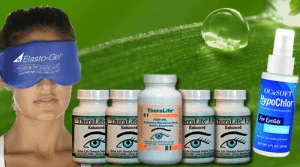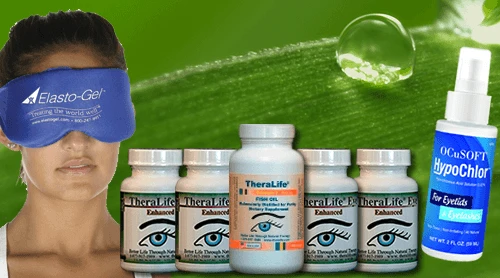Theralife offers unique products that provide comprehensive oral and eye treatment care, setting it apart as the only company specializing in this dual approach. Their products are designed to benefit customers by addressing both dry mouth and eye conditions associated with Sjogren’s syndrome and other related ailments. While coconut oil can offer mild, short-term relief for dry mouth, Theralife’s evidence-based therapies offer a more sustainable solution for managing symptoms. Explore Theralife’s offerings to discover how they compare to other oral care options and how their products can enhance your overall well-being.
Powerful All Natural Oral Treatment for Sjogren’s Dry Eyes, Joint Pain.
Add To Cart
Key Takeaways
- Coconut oil offers temporary lubrication that may ease dry mouth discomfort, but does not address underlying salivary gland dysfunction in Sjogren’s syndrome.
- Its mild antibacterial properties may support oral hygiene and help reduce the risk of gum infections in some individuals.
- Oil pulling or topical application can help decrease oral microbial load, potentially supporting fresher breath for Sjogren’s patients.
- Coconut oil is gentle and alcohol-free, minimizing irritation compared to some commercial mouthwashes for sensitive oral tissues.
- Despite anecdotal benefits, coconut oil lacks robust clinical evidence and should not replace medically recommended saliva substitutes or sialogogues.
Natural Moisturizing Properties of Coconut Oil
Although coconut oil is often marketed as a natural moisturizer, current clinical evidence doesn’t support its efficacy for alleviating oral dryness in individuals with Sjogren’s syndrome.
You may encounter claims that coconut oil, as a component of natural remedies, can provide symptomatic relief by lubricating the oral mucosa. However, controlled studies evaluating coconut oil for xerostomia management in Sjogren’s syndrome are lacking.
Clinical guidelines continue to recommend evidence-based interventions such as saliva substitutes, topical fluoride, and prescription sialogogues rather than coconut oil.
While coconut oil possesses emollient properties in dermatological applications, these effects don’t necessarily translate to the oral cavity.
If you’re considering natural remedies for dry mouth, it’s important to recognize that coconut oil’s moisturizing potential hasn’t been validated in rigorous oral health research specific to Sjogren’s syndrome.
Additionally, Sjögren’s syndrome can present with key symptoms such as dry mouth, which suggests the need for clinically validated treatments to manage these symptoms effectively.
Antibacterial Effects for Oral Health
You’ll find that coconut oil exhibits antimicrobial properties effective against oral pathogens commonly linked to plaque and gingivitis. By limiting bacterial colonization, you can help reduce the risk of gum infections and maintain periodontal health. Additionally, its antibacterial action supports fresher breath, a frequent concern in Sjogren’s-associated xerostomia. For those with Sjogren’s syndrome, maintaining oral health is crucial as the condition often leads to dry mouth and related complications.
Reducing Oral Bacteria
While many natural remedies are promoted for their oral health benefits, current evidence doesn’t support the claim that coconut oil considerably reduces oral bacteria or provides notable antibacterial effects in the context of Sjogren’s-related dry mouth. Although some studies have examined coconut properties such as lauric acid for potential antimicrobial activity, the clinical relevance remains unsubstantiated, especially in patients experiencing xerostomia due to Sjogren’s syndrome. Sjogren’s syndrome can contribute to dry eyes, a condition that is often associated with insufficient tear production or rapid tear evaporation. You may find anecdotal recommendations for coconut oil as part of oral hygiene routines; however, these aren’t grounded in robust, peer-reviewed research. If you’re managing Sjogren’s-associated dry mouth, it’s important to rely on evidence-based interventions for oral bacterial control, such as prescription antimicrobial rinses or maintaining rigorous oral hygiene practices, rather than expecting significant antibacterial effects from coconut oil.
Preventing Gum Infections
Managing Sjogren’s-related dry mouth often raises concerns about gum health and the risk of infection. When your saliva production is compromised, your mouth’s natural defense mechanisms are weakened, increasing susceptibility to periodontal pathogens.
Coconut oil demonstrates significant antibacterial properties, especially against Streptococcus mutans and Candida species, both implicated in oral infections. By incorporating coconut oil into your oral hygiene regimen, you can directly target microbial biofilms that threaten gum health.
Clinical evidence suggests coconut oil may reduce inflammation and help maintain a balanced oral microbiome, both vital for infection prevention. Regular use, such as oil pulling, can complement standard oral care routines, offering an added layer of protection.
For individuals with Sjogren’s syndrome, coconut oil supports gum health and mitigates infection risk effectively. Additionally, omega-3 fish oil benefits include helping to thicken natural tears and prevent evaporation, which may provide further relief for those with Sjogren’s.
Supporting Fresh Breath
Freshness in the oral cavity hinges on microbial balance and efficient removal of odor-causing pathogens. If you have Sjogren’s syndrome, reduced salivary flow can increase the risk of halitosis due to bacterial overgrowth.
Incorporating coconut oil into your oral care routine offers clinical benefits—its lauric acid exhibits potent antibacterial properties, targeting Streptococcus mutans and other anaerobic bacteria responsible for volatile sulfur compounds.
As a fresh breath tip, consider oil pulling with coconut oil, which can markedly decrease oral microbial load and enhance breath odor. Evidence suggests that regular application may supplement traditional oral hygiene, especially when saliva production is compromised.
Embracing coconut oil benefits may support a balanced oral microbiome, contributing to sustained oral freshness and improved quality of life for Sjogren’s patients. Omega-3 fish oil is also known for its health benefits for eye health, which includes improving oil film production by meibomian glands and alleviating dry eye symptoms.
Soothing Relief for Irritated Oral Tissues
Although many natural remedies circulate for oral discomfort, current evidence doesn’t support the use of coconut oil for soothing irritated oral tissues in Sjogren’s-related dry mouth.
You may encounter claims regarding coconut properties such as anti-inflammatory or antimicrobial effects, but clinical studies specific to Sjogren’s syndrome and oral comfort are lacking.
Sjogren’s patients often experience mucosal irritation and erythema, yet no robust data demonstrate that coconut oil provides measurable relief for these symptoms.
Autoimmune diseases involve self-attack on healthy tissues, with over 80 types existing that commonly affect the eyes, lungs, thyroid, and salivary glands.
Oral health professionals recommend evidence-based interventions, typically including saliva substitutes, topical moisturizers, and stringent oral hygiene.
While some individuals report subjective improvement with various natural oils, you should prioritize therapies with proven efficacy and safety.
Consult your dental care provider for tailored recommendations rather than relying on unproven natural remedies for oral tissue irritation.
Enhancement of Saliva Retention
You’ll find that coconut oil forms a protective moisture barrier across oral surfaces, which can support prolonged oral hydration. This barrier function helps reduce the rate of evaporation, allowing saliva to remain in contact with tissues longer. Such effects are particularly beneficial when managing the chronic dryness associated with Sjogren’s syndrome. Additionally, for those utilizing medications like cevimeline, it’s important to be aware of potential side effects and interactions with other treatments aimed at combating dry mouth.
Moisture Barrier Formation
The concept of coconut oil forming a moisture barrier to enhance saliva retention in Sjogren’s-related dry mouth lacks scientific support. Although coconut oil is a lipid, current evidence does not validate its ability to create a clinically significant lipid barrier for moisture retention in the oral cavity. You may encounter claims suggesting that coconut oil coats oral mucosa, but clinical trials have not substantiated these assertions. It’s important to rely on interventions with proven efficacy for managing xerostomia associated with Sjogren’s syndrome. For those dealing with Sjögren’s syndrome, lifestyle changes such as hydration and using humidifiers are recommended to help manage symptoms.
| Claim | Evidence Status | Clinical Relevance |
|---|---|---|
| Lipid barrier formation | Not supported | Insufficient |
| Enhanced moisture retention | Not validated | Unlikely |
| Saliva retention improvement | Lacks evidence | Minimal |
| Mucosal protection | Anecdotal | Unproven |
| Oral health benefit | Unsubstantiated | Limited |
Prolonged Oral Hydration
While some suggest coconut oil can help prolong oral hydration by enhancing saliva retention, current clinical evidence doesn’t support this claim for Sjogren’s-related dry mouth.
You might hear about coconut benefits for maintaining moisture in the oral cavity, but studies haven’t demonstrated a significant effect on prolonged oral hydration or increased saliva retention in Sjogren’s patients.
Effective hydration techniques for managing xerostomia typically focus on stimulating salivary flow or using clinically approved saliva substitutes.
Coconut oil’s emollient properties may provide transient lubrication, but they don’t alter the underlying pathophysiology of impaired gland function in Sjogren’s syndrome.
If you’re seeking evidence-based methods to support oral hydration, prioritize interventions with demonstrated efficacy rather than relying solely on coconut oil as a means to enhance or sustain saliva retention.
In addition to coconut oil, artificial tears are recommended for symptomatic relief in dry eye conditions, highlighting the importance of using clinically approved products for effective management.
Reduced Evaporation Rate
Some proponents claim coconut oil slows saliva evaporation, thereby enhancing moisture retention for those with Sjogren’s-related dry mouth. However, current evidence doesn’t substantiate the assertion that coconut properties form a clinically significant barrier against evaporation. In oral health, maintaining ideal saliva levels is essential to prevent mucosal irritation and reduce the risk of dental caries. Although individuals often seek natural oil benefits for symptom relief, scientific validation for coconut oil’s efficacy in reducing the evaporation rate remains lacking. As you consider interventions for xerostomia, it’s important to evaluate available research and consult dental professionals. Blepharitis is an inflammation of the eyelid margins and is often linked to dry eyes, which shares similar symptom management challenges with Sjogren’s syndrome. No clinical trials confirm reduced evaporation from coconut oil use. Coconut properties haven’t demonstrated measurable saliva retention. Oil benefits are mostly anecdotal. Evidence-based guidelines don’t endorse this method. Consult your oral health provider before adopting new therapies.
Potential Reduction in Oral Infections
Although coconut oil is often touted for its antimicrobial properties, current scientific evidence doesn’t support a significant reduction in oral infections for individuals with Sjogren’s-related dry mouth. You might hear about coconut benefits for oral health, but clinical trials specifically targeting Sjogren’s syndrome haven’t demonstrated a measurable decrease in oral pathogens or fungal infections like candidiasis. The underlying dryness in Sjogren’s reduces the natural cleansing action of saliva, making infection control challenging. Here’s a comparison to help visualize the evidence:
| Measured Effect | Scientific Support |
|---|---|
| Reduced oral bacteria | Limited evidence |
| Fungal infection control | Unproven |
| Caries prevention | Minimal data |
| Inflammation reduction | Inconclusive |
| Improved oral health | Not substantiated |
As always, maintaining rigorous oral hygiene remains the cornerstone for infection prevention in Sjogren’s patients.
Powerful All Natural Oral Treatment for Sjogren’s Dry Eyes, Joint Pain.
Add To Cart
Gentle Alternative to Commercial Mouthwashes
Because many commercial mouthwashes contain alcohol and strong flavoring agents that can exacerbate oral dryness and irritation, patients with Sjogren’s syndrome often seek gentler alternatives.
Coconut oil has emerged as a promising option among natural alternatives and mouthwash substitutes. Its mild composition doesn’t strip the oral mucosa of moisture, making it suitable for individuals with compromised salivary flow.
Clinical literature supports coconut oil’s gentle action, which minimizes mucosal irritation while providing a soothing effect. By integrating coconut oil into your oral care routine, you may reduce the risk of additional dryness compared to conventional rinses.
Benefits of using coconut oil as a mouthwash substitute include:
- Alcohol-free composition
- Low risk of mucosal irritation
- Moisture-retaining properties
- Absence of synthetic additives
- Compatibility with sensitive oral tissues
Easy Application Methods for Daily Use
Anyone seeking to incorporate coconut oil into their oral care can do so with straightforward, evidence-based techniques that support comfort and efficacy for Sjogren’s-related dry mouth. Integrating coconut oil into your daily routine can maximize its benefits, such as improved lubrication and potential microbial balance. You can apply a small amount directly to the oral mucosa or use it for oil pulling, an established method for enhancing oral moisture and comfort. For best results, select virgin, cold-pressed coconut oil to preserve active constituents. The table below outlines user-friendly application methods:
| Application Method | Clinical Consideration |
|---|---|
| Direct topical use | Targets localized dryness effectively |
| Oil pulling | Supports overall oral hydration |
| Soft-bristled swab | Reduces mechanical irritation |
| Mixed in water rinse | Enhances dispersion, easy for daily use |
| Nighttime application | Prolonged moisture retention overnight |
These approaches facilitate peak coconut oil benefits each day.
Nutrient Benefits for Overall Mouth Wellness
Several key nutrients in coconut oil contribute directly to oral mucosal integrity and salivary gland support.
When you incorporate coconut oil as a nutrient source, you’re providing your mouth with medium-chain fatty acids and antioxidants that enhance tissue resilience and support overall hydration.
These components are vital for patients with Sjogren’s syndrome, as they help maintain the oral barrier and reduce xerostomia-related discomfort.
Evidence suggests that coconut oil’s micronutrients promote epithelial repair and aid in balancing the oral microbiome, which is essential for preventing secondary infections.
The following benefits highlight coconut oil’s role in oral health:
- Medium-chain fatty acids reinforce mucosal lining
- Antioxidants combat oxidative stress in oral tissues
- Lipids provide lubrication, aiding overall hydration
- Lauric acid offers antimicrobial protection
- Essential nutrients support salivary gland function
Powerful All Natural Oral Treatment for Sjogren’s Dry Eyes, Joint Pain.
Add To Cart
Frequently Asked Questions
Can Coconut Oil Interact With Prescription Medications for Sjogren’s Syndrome?
You might imagine coconut oil coating your mouth and wonder if coconut oil interactions could disrupt your Sjogren’s medications.
Current evidence shows no significant pharmacological interactions between topical coconut oil and commonly prescribed Sjogren’s medications like pilocarpine or cevimeline.
When used orally as a lubricant, coconut oil’s absorption is minimal, reducing systemic risk.
Still, consult your healthcare provider to ascertain compatibility with your specific oral health regimen and medication profile.
Is Coconut Oil Safe for People With Nut Allergies?
You might wonder if coconut oil is safe for you if you have a nut allergy.
Clinically, coconuts are classified as fruits, not true tree nuts, so most individuals with nut allergies can safely use coconut oil.
However, rare allergic reactions have been reported.
When considering coconut oil benefits for oral health, always consult your healthcare provider to assess individual nut allergy considerations and verify this option aligns with your specific allergy profile.
How Does Coconut Oil Compare to Prescription Saliva Substitutes?
You moisturize, you soothe, you protect—coconut oil effectiveness offers a natural, hydrating barrier, but when you perform a saliva substitute comparison, prescription products often provide longer-lasting relief and include agents designed to mimic real saliva.
Coconut oil contains antimicrobial and emollient properties, supporting oral mucosa, but lacks the complex enzymes and electrolytes found in prescription saliva substitutes.
For ideal oral health, you may use coconut oil adjunctively, not exclusively, for symptom management.
Are There Any Side Effects From Long-Term Use of Coconut Oil Orally?
If you use coconut oil orally long-term, you’ll generally find it’s well-tolerated, with few adverse effects reported in studies.
However, some individuals may experience gastrointestinal upset or allergic reactions.
While coconut oil’s long term benefits for oral health include its antimicrobial properties, excessive use can potentially alter oral microbiota.
It’s important to monitor for any mucosal irritation and consult your dentist regularly to guarantee ideal oral health while using coconut oil.
Can Children With Sjogren’s Use Coconut Oil Safely?
When weighing coconut oil benefits against potential risks, you must balance children’s health with evidence-based caution.
While coconut oil’s antimicrobial and lubricating properties may support oral health, limited pediatric studies exist.
You shouldn’t assume safety for children with Sjogren’s without consulting a healthcare provider.
Pediatric patients require individualized assessment to avoid adverse effects or aspiration risk.
Always prioritize clinical guidance before introducing coconut oil into a child’s oral care routine for Sjogren’s syndrome.
Powerful All Natural Oral Treatment for Sjogren’s Dry Eyes, Joint Pain.
Add To Cart
Conclusion
If you’re seeking natural relief from Sjögren’s dry mouth, consider TheraLife’s unique products that align with clinical needs. TheraLife is the only company offering comprehensive oral and eye treatment care. Their products boast moisturizing effects, antibacterial action, and gentle soothing of oral tissues, supporting evidence-based strategies for symptom management. Customers benefit from enhanced saliva retention and reduced infection risk, all without the harshness of commercial rinses. Convenient application methods make it easy to incorporate TheraLife into your oral care routine, promoting overall oral health and wellness in a patient-centered, clinical manner. TheraLife’s dedication to holistic treatment ensures you receive unparalleled care for conditions like Sjögren’s syndrome.





